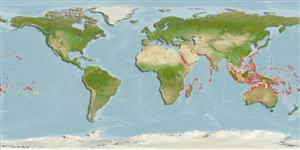Environment: milieu / climate zone / depth range / distribution range
Ecologia
marinhas associadas(os) a recifes; intervalo de profundidade 5 - 30 m (Ref. 9823). Tropical; 30°N - 28°S
Indo-Pacific: Red Sea to the Tuamoto Islands, north to Ryukyu Islands, south to Rapa.
Tamanho / Peso / Idade
Maturity: Lm ? range ? - ? cm
Max length : 18.0 cm TL macho/indeterminado; (Ref. 30573)
Espinhos dorsais (total) : 9; Raios dorsais moles (total) : 12; Espinhos anais: 3; Raios anais moles: 11 - 13. Body brown, shading to yellow on abdomen, thorax and lower head, and to reddish posteriorly; reddish lips; posterior of operculum with a large black spot, a green spot above and adjacent to this, and above this is a red spot. Pectoral base with a dark brown bar. Dorsal spines pungent.
Adults occur in clear lagoon and seaward reefs from the lower surge zone to a depth of 30 m (Ref. 1602). Usually in areas with mixed rubble, coral, or rock and sand (Ref. 9710). Usually solitary among large corals. Small juveniles swim with their head down, keeping dorsal and anal fins erected, and may seem like the face of a larger fish when viewed from side on by a predator (Ref. 48636). Oviparous, distinct pairing during breeding (Ref. 205). Occasionally seen in fish markets and aquarium trade.
Life cycle and mating behavior
Maturities | Reprodução | Spawnings | Egg(s) | Fecundities | Larvas
Oviparous, distinct pairing during breeding (Ref. 205).
Westneat, M.W., 2001. Labridae. Wrasses, hogfishes, razorfishes, corises, tuskfishes. p. 3381-3467. In K.E. Carpenter and V. Niem (eds.) FAO species identification guide for fishery purposes. The living marine resources of the Western Central Pacific. Vol. 6. Bony fishes part 4 (Labridae to Latimeriidae), estuarine crocodiles. FAO, Rome. (Ref. 9823)
Categoria na Lista Vermelha da IUCN (Ref. 130435)
Ameaça para o homem
Harmless
Utilização humana
Pescarias: pouco comercial; Aquário: Espécies comerciais
Ferramentas
Relatórios especiais
Descarregue XML
Fontes da internet
Estimates based on models
Preferred temperature (Ref.
123201): 24.9 - 29.3, mean 28.2 °C (based on 2766 cells).
Phylogenetic diversity index (Ref.
82804): PD
50 = 0.5002 [Uniqueness, from 0.5 = low to 2.0 = high].
Bayesian length-weight: a=0.00977 (0.00470 - 0.02030), b=3.07 (2.89 - 3.25), in cm total length, based on LWR estimates for this (Sub)family-body shape (Ref.
93245).
Nível Trófico (Ref.
69278): 3.5 ±0.37 se; based on food items.
Resiliência (Ref.
120179): Elevada, tempo mínimo de duplicação da população menor que 15 meses (Preliminary K or Fecundity.).
Fishing Vulnerability (Ref.
59153): Low vulnerability (10 of 100).
Nutrients (Ref.
124155): Calcium = 76.6 [46.0, 126.8] mg/100g; Iron = 0.683 [0.402, 1.246] mg/100g; Protein = 18.5 [15.6, 20.7] %; Omega3 = 0.153 [0.101, 0.236] g/100g; Selenium = 23.8 [14.6, 42.4] μg/100g; VitaminA = 138 [43, 498] μg/100g; Zinc = 1.61 [1.12, 2.51] mg/100g (wet weight);
